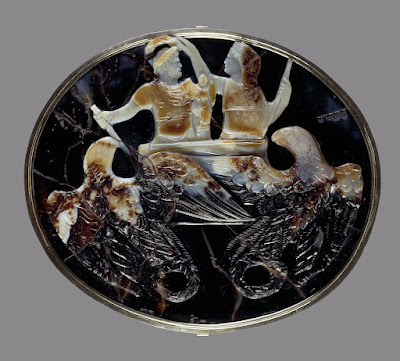-17th-century-Italy-(marble-body)-Ch%C3%A2teau-de-Versailles.jpg) |
| Roman Empire Caligula 1st century AD (porphyry head) 17th century Italy (marble body) Château de Versailles |
 |
| Roman Empire Claudius AD 41 marble Herzog Anton Ulrich Museum, Braunschweig |
-1st-century-AD-marble-Antikensammlung-Staatliche-Museen-zu-Berlin.jpg) |
| Roman Empire Claudius (recarved from a likeness of Caligula) 1st century AD marble Antikensammlung, Staatliche Museen zu Berlin |
-and-alabaster-(body)-Hall-of-the-Emperors-Galleria-Borghese-Rome.jpg) |
| Cosimo Fancelli Vitellius 1676 porphyry (head) and alabaster (body) Hall of the Emperors, Galleria Borghese, Rome |
-and-alabaster-(body)-Hall-of-the-Emperors-Galleria-Borghese-Rome.jpg) |
| Tommaso Fedeli Vespasian 1619 porphyry (head) and alabaster (body) Hall of the Emperors, Galleria Borghese, Rome |
-National-Archaeological-Museum-Athens.jpg) |
| Ancient Greek Culture under the Roman Empire Hadrian AD 130 marble (excavated in Athens) National Archaeological Museum, Athens |
 |
| Roman Empire Hadrian as World Ruler AD 130 sardonyx cameo Antikensammlung, Staatliche Museen zu Berlin |
-National-Archaeological-Museum-Athens.jpg) |
| Ancient Greek Culture under the Roman Empire Hadrian AD 130-140 marble (colossal statue fragment excavated in Athens) National Archaeological Museum, Athens |
 |
| Roman Empire Lucius Verus AD 150-200 marble Musée d'Art Classique de Mougins |
-Mus%C3%A9e-d'Art-Classique-de-Mougins.jpg) |
| Roman Empire Marcus Aurelius AD 160-180 marble Musée d'Art Classique de Mougins |
 |
| Anonymous Italian Artist Marcus Aurelius ca. 1500 bronze plaquette Kunsthistorisches Museum, Vienna |
-Saint-Louis-Art-Museum.jpg) |
| Joseph Claus Caracalla 1757 marble (after antique original) Saint Louis Art Museum |
 |
| Roman Empire Caracalla AD 196-204 marble Musée d'Art Classique de Mougins |
-Rijksmuseum-van-Oudheden-Leiden.jpg) |
| Roman Empire Gallienus AD 260 marble (excavated in North Africa) Rijksmuseum van Oudheden, Leiden |
 |
| Edme Bouchardon Portrait of Baron Philipp von Stosch as Roman Emperor 1727 marble Bode Museum, Berlin |
But Figulus more seene in heavenly mysteries,
Whose like Aegiptian Memphis never had
For skill in stars, and tune-full planeting,
In this sort spake. The worlds swift course is lawlesse
And casuall; all the starres at randome radge:
Or if Fate rule them, Rome thy Cittizens
Are neere some plague: what mischiefe shall insue?
Shall townes be swallowed? shall the thickned aire,
Become intemperate? shall the earth be barraine?
Shall water be conjeal'd and turn'd to ice?
O Gods what death prepare ye? with what plague
Mean ye to radge? the death of many men
Shall townes be swallowed? shall the thickned aire,
Become intemperate? shall the earth be barraine?
Shall water be conjeal'd and turn'd to ice?
O Gods what death prepare ye? with what plague
Mean ye to radge? the death of many men
Meetes in one period. If cold noysome Saturne
Were now exalted, and with blew beames shinde,
Then Gaynimede would renew Deucalions flood,
Then Gaynimede would renew Deucalions flood,
And in the fleeting sea the earth be drencht.
O Phœbus shouldst thou with thy rayes now sing
The fell Nemean beast, th' earth would be fired,
And heaven tormented with thy chafing heate,
But thy fiers hurt not: Mars, 'tis thou enflam'st
O Phœbus shouldst thou with thy rayes now sing
The fell Nemean beast, th' earth would be fired,
And heaven tormented with thy chafing heate,
But thy fiers hurt not: Mars, 'tis thou enflam'st
The threatning Scorpion with the burning taile
And fier'st his cleyes. Why art thou thus enrag'd?
And fier'st his cleyes. Why art thou thus enrag'd?
Kind Jupiter hath low declin'd himselfe;
Venus is faint; swift Hermes retrograde;
Mars onely rules the heaven: why doe the Planets
Alter their course; and vainly dim their vertue?
Venus is faint; swift Hermes retrograde;
Mars onely rules the heaven: why doe the Planets
Alter their course; and vainly dim their vertue?
– from the First Book of Lucan, translated by Christopher Marlowe (published 1600)
-AD-320-30-sardonyx-with-17th-century-gold-mount-(former-Rubens)-Rijksmuseum-van-Oudheden-Leiden.jpg)